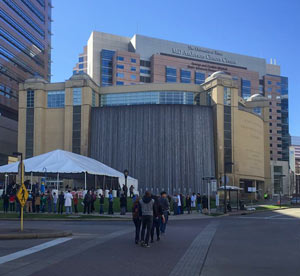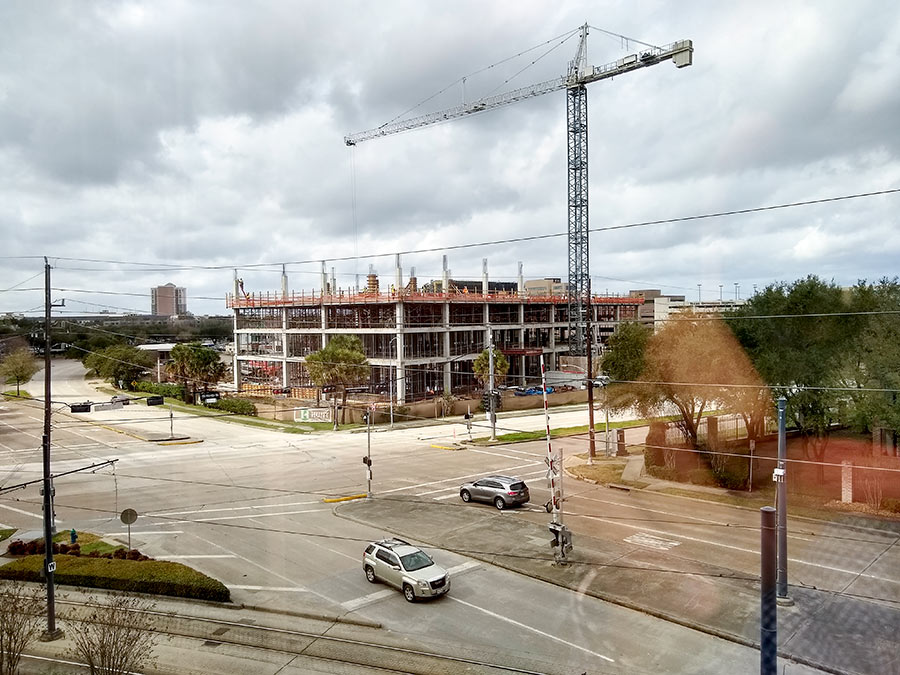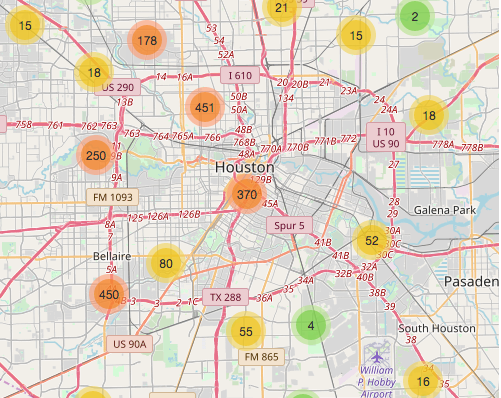WHERE THE HECK IS HOUSTON’S BIOTECH BOOM?  Almost $3 billion in new construction projects are underway in the Texas Medical Center, says Roxanna Asgarian in last month’s Houstonia. The district is known as the world’s largest cluster of medical practice and research facilities — but “what the TMC is not known for,” writes Asgarian, “is turning that research into new drugs and devices . . . The situation is, in many respects, baffling. All the major building blocks for a thriving biotech industry exist here, including huge clinical and research institutions, world-renowned physicians and researchers, highly skilled engineers, and a bustling business community. So what’s missing?” [Houstonia] Photo of Texas Medical Center Commons parking garage at 6550 Bertner Ave.: Texas Medical Center
Almost $3 billion in new construction projects are underway in the Texas Medical Center, says Roxanna Asgarian in last month’s Houstonia. The district is known as the world’s largest cluster of medical practice and research facilities — but “what the TMC is not known for,” writes Asgarian, “is turning that research into new drugs and devices . . . The situation is, in many respects, baffling. All the major building blocks for a thriving biotech industry exist here, including huge clinical and research institutions, world-renowned physicians and researchers, highly skilled engineers, and a bustling business community. So what’s missing?” [Houstonia] Photo of Texas Medical Center Commons parking garage at 6550 Bertner Ave.: Texas Medical Center





Good question, perhaps it is the quality and quantity of universities in the biotech spots, Boston/NE, NC (Research Triangle), and So Cal.
I’ve always been a bit perplexed that there isn’t more of a biotech presence in the TMC. You’d think that such a large complex would provide the perfect opportunity.
What’s missing is location. Biotech grew up in Massachusetts and California, where there are high-powered research institutions in high concentrations, and where nearly all the founding scientists were located. Research Park Triangle in NC is a big player, too: again, a high concentration of high-powered universities. Federal research dollars pour into these places. Factor in a certain sociological bias, too. Texas is a fly-over state, and you can’t argue with geography.
It’s coming. The TMC seems to be working toward this goal with TMC3 and the current startup incubator program they just began. Other parts of the country with biotech have older hospital systems that were established… but now the TMC is the place everyone seems to want to be.
For a while, The Woodlands was posturing itself as the biotech hub (Research Forest Dr., anyone) and a lot of the companies located there were TMC spinoffs.
I think that part of the difficulty is that UT and BCM aren’t first-and-foremost research institutions like the California, NC and Boston universities mentioned here. They’re phenomenal teaching and training institutions, but their research bodies aren’t quite as cutting edge, particularly when it comes to research that can be monetized.
Yes, part of it has to do with a relative dearth of university research presence. But a bigger part of it has to do with VC leverage; there is very simply a broader and deeper pool of talent in other metropolitan areas, and that goes for employees as well as for investors.
.
It may be possible for Houston to chip away at that, but its going to take a commitment on a wholly different scale than what has been done in the past. We need more doctors’ residency programs, more research expenditure, more conferences, and venture capital that is committed to Houston for some minimal term.
MD Anderson, Baylor, Methodist, and UT Houston all have very strong research components. Unfortunately there is a heck of a lot of infighting and competition for increasingly scarce basic science funding. (This is not unique to Houston, Harvard/Brigham and Women’s is well known as a snake pit where no one dares collaborate with anyone else at Harvard)
Also, there is a huge delay in moving products to commercialization because the universities are WAY behind on intellectual property law and terribly understaffed in this regard. Death by 1000 cuts.
It’s not just the research component; it’s also the scale up and manufacturing component, the high tech skills component to put together medical devices, to manufacture pharmaceuticals, as well as run human trials. Houston had the research component and the clinical trials component, but is our city capable of providing highly skilled labor to manufacture devices and pharmaceuticals? Do we have the know-how and experience? Are our high schools and community colleges capable of providing that know how? Yes we have a city full of engineers but we’re overweighted in oil and gas. Bring those biomedical, chemical, and process engineers here and build that infrastructure. Then we’ll be ready.
To expand on some of these comments, the institutions at TMC are mainly health-related as mentioned, but in addition, none are full-service elite universities (cf UCSD, UCSF, UC Berk, MIT, Harvard on the coasts). Baylor College of Medicine is just a college. MD Anderson’s mission is to cure cancer, and UTHSC-H is just one of the poor relations in the extended UT clan. Rice is too small to matter. UH in embryo has the necessary combination of health sciences, engineering, law and business to get biotech rolling, but the greed of UT and A&M, together with the insecurity of TSU, will forever keep UH firmly in its place. I cannot speak to structural problems at TMC relating to start-ups, but occasionally hear about things, such as creating a TMC-wide IRB, or the new Johnson and Johnson JLab incubator.
Could people seriously quit blaming all of UH’s problems on UT and A&M? It wasn’t UT/A&M that chose to dump however many millions of dollars into the football stadium/program. It wasn’t UT/A&M that kept UH from actually reaching Tier 1 potential until only a few years ago. Sure, UT/A&M have been incredibly cutthroat now that UH actually is performing a bit better, but let’s get real. Do you expect them to reach a hand out and help pull UH up into their ranks and give them a big hug? Of course not, it’s a very competitive world. Competition makes us better. Or it could, if people stopped making excuses and started holding UH to higher standards.
.
And as for why we have difficulties with getting biotech here? Well, UH definitely doesn’t help that, but really that’s not the issue. The issue is that biotech is VC driven and there are more attractive places, like Austin, for startups like that. What’s the real need to have it in TMC when you could put it in a hippy haven, draw fresh grads from UT and pay them nothing. You can always drive to Houston for your clinical trials.
Possibly off topic, but I remember listening to a series of stories on NPR about a relative lack of tech start ups in Houston. As opposed to other metro areas, Houston’s engineering talent is tethered to giant, stable, and well-paying oil companies like BP, Hess, Exxon, etc… Their point was that because these jobs were so good and stable, it was very difficult to get employees to jump ship and risk everything on a start up. As these companies shed engineers, we may see increased start ups in Houston.
the imported, ruinous toxicity that is crushing and looting the tech industry itself is pretty embedded in Houston, some would say established – wait long enough for the carnage to subside and Houston will look attractive by comparison
Maybe this guy is a metaphor for the Houston economy itself! :)
http://newsok.com/article/5494114